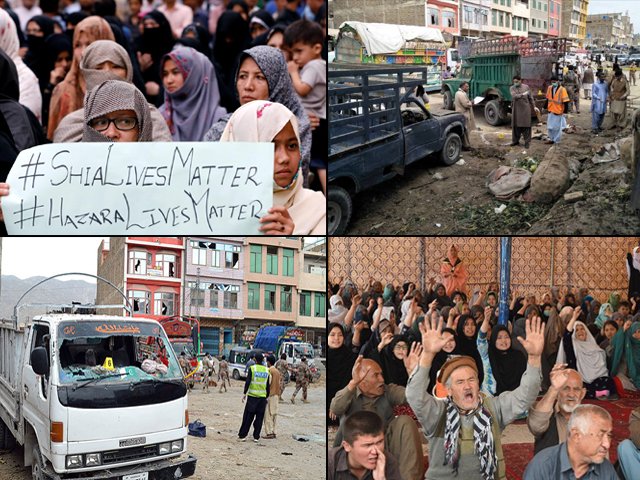
Don’t touch my bakra!
If there is one place to avoid right now, it’s the mandi.
Eidul Azha is probably one of our most anticipated holidays in the yearly calendar. Depending on one’s inclination, people normally plan for this religious duty months in advance. Its popularity is also due to the high level of interest that children take in the festivities and it would not be incorrect to say that it is more of children’s Eid than ours.
Personally, I am not inclined towards it – I guess the sight of animal blood, urine and faeces all over our cityscape is not very appealing to me and we have our efficient government to thank for this. We have had roughly 69 Eids since Pakistan’s independence and no policy on how people should keep and manage their sacrificial animals without creating an environmental disaster. The best they can do is visit after qurbani (sacrifice) and pick up animal entrails sprawling all over our city streets.
I think every person has either fallen ill himself or known someone who has fallen ill during the Eidul Azha holidays, mainly because of the lack of basic sanitation compounded by the animal droppings all over our cities. If this was not enough, this year we have to contend with the Crimean-Congo Hemorrhagic Fever (CCHF) virus or the Congo Virus for the layman.
Pakistan has had to contend with numerous other plagues in recent years such as dengue, naegleria fowleri (the brain eating amoeba) and Ebola. Besides these fatal illnesses, Pakistan remains to be one of only two countries with an active polio Virus profile. Since our government’s health campaigns fall short either due to negligence or due to violence (as in the case of the Polio campaign), we can safely assume that the Congo virus is going to be a bigger threat than we can imagine.
Having rightfully bashed the government, I do wish to add that unfortunately we, the citizens of Pakistan, are also partly to blame for our own destruction. The conservative and ignorant notions attached to the polio vaccine which were circulated by some of our ‘mullahs’, led to the martyrdom of numerous Polio vaccination team members. Our habits such as the improper disposal of waste especially animal waste (during Eid season) leads to most airborne and waterborne diseases we are plagued with (throwing it out of one’s door does not count as proper disposal).
The Congo virus, which has now become the new media sensation, is actually a very dangerous disease with up to 40% mortality rate. The early symptoms are similar to flu and it is only after a week that the serious symptoms start to appear. For further reading, please look up the World Health Organisation (WHO) webpage on CCHF. The government did not start an awareness campaign regarding the virus. However, they did issue warnings.
The virus spreads through blood and carried by ticks, mites or flees which bite and infect a host. The disease transfers into humans once a tick bites an infected animal and then bites the human. Thus, a child petting an infected animal can easily become a victim. Anyone exposed to the animal’s blood post-sacrifice is also at risk. Pesticides need to be used on livestock to cull any parasites, which cause the disease to spread. Experts say that the spraying needs to be done at least two weeks in advance. Such a measure seems unlikely to be taken effectively.
Constant infomercials are being aired requesting people to avoid unnecessary contact with animals, wearing gloves while handling them and making sure that children don’t come in contact with any livestock. That’s like asking children to walk through Willy Wonka’s factory and not have any chocolate.
The WHO also issued public health advice focusing on several aspects, which I am quoting below for everyone’s convenience:
Reducing the risk of tick-to-human transmission
- wear protective clothing (long sleeves, long trousers);
- wear light coloured clothing to allow easy detection of ticks on the clothes;
- use approved acaricides (chemicals intended to kill ticks) on clothing;
- use approved repellent on the skin and clothing;
- regularly examine clothing and skin for ticks; if found, remove them safely;
- seek to eliminate or control tick infestations on animals or in stables and barns; and
- avoid areas where ticks are abundant and seasons when they are most active.
Reducing the risk of animal-to-human transmission
- wear gloves and other protective clothing while handling animals or their tissues in endemic areas, notably during slaughtering, butchering and culling procedures in slaughterhouses or at home;
- quarantine animals before they enter slaughterhouses or routinely treat animals with pesticides two weeks prior to slaughter.
Reducing the risk of human-to-human transmission in the community
- avoid close physical contact with CCHF-infected people;
- wear gloves and protective equipment when taking care of ill people;
- wash hands regularly after caring for or visiting ill people.
With the constant rain, one can only hope that pests don’t multiply. Last weekend’s sporadic rain drenched the whole bakra (goat) mandi outside Karachi, turning it into a mud pit. If there is one place to avoid right now, it’s the mandi. However for the sake of your safety, please wear gloves and a mask at all times around animals, use antibacterial products if you are not currently using them and make sure children are kept away from the place where you carry out the sacrifice. Also arrange for the washing of fresh meat outside your house before you move it inside.
Your life is in your hands. Don’t pay heed to WhatsApp messages claiming there is a grand conspiracy afoot and the west wants to deter us from our Sunnat e Ibrahimi by spreading baseless lies about the Congo Virus. Please be careful, such diseases can be deadly. Handle everything with care and of course tell everyone to keep their hands off your bakra.




COMMENTS (1)
Comments are moderated and generally will be posted if they are on-topic and not abusive.
For more information, please see our Comments FAQ